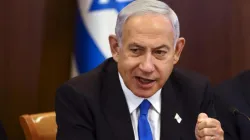'Israel will make its 'own decisions' on responding to Iran', asserts Netanyahu ignoring West pressure
Israel will make its own decisions about how to defend itself, Prime Minister Benjamin Netanyahu said, as Western countries pleaded for restraint in responding to a volley of attacks from Iran.

Jerusalem: Despite mounting pressure from the West, Israeli Prime Minister Benjamin Netanyahu, on Wednesday, staunchly asserted that his country would be the one to decide whether and how to respond to Iran's major air assault earlier this week. Thus keeping aside the wider aspect of the spiralling situation on the whole world. Although the Israeli Prime Minister Israel has vowed to respond to Iran's unprecedented attack, he did not utter a single word on "when" or "how".
Israel's allies have been urging Israel since the attack to hold back on any response that could spiral. These calls were repeated on Wednesday during visits by the British and German foreign ministers. The diplomatic pressures came as Iran's president warned that even the “tiniest” invasion of its territory would bring a “massive and harsh” response.
Violence increased after Hezbollah group firing
Violence meanwhile surged on Wednesday between Israel and the Iran-backed Lebanese militant Hezbollah group, which fired a volley of rockets and drones on northern Israel. The attack wounded at least 14 Israeli soldiers, six seriously, the army said. The military said it struck Hezbollah targets deep inside Lebanon in response.
Also Read: Iranian President Raisi warns 'massive response' to Israel's 'tiniest invasion' as rivalries deepen
Speaking at a meeting of his Cabinet, Netanyahu said he met Wednesday with both visiting foreign ministers and thanked them for their countries' support. But he said Israel would make the call on its own on how to respond despite "all sorts of suggestions and advice" coming from Israel's allies, some of whom — including the United States, the United Kingdom and France — helped Israel repel Iran's drone and missile assault.
"I want to be clear"
"I want to be clear: we will make our decisions ourselves. The state of Israel will do whatever is necessary to defend itself," Netanyahu said.
Despite the tough rhetoric, Israel appears unlikely to attack Iran directly without at least the support of its top ally, the US. However, it could resort to more covert methods such as targeting senior Iranian commanders or Iran-backed groups in other countries or launching a cyber attack. It's unclear how Iran would then respond, given the heightened tensions — any miscalculation by either side risks setting off a regional war.
President Joe Biden's administration on Tuesday announced new sanctions on Iran and has worked to coordinate a global rebuke of the attack while urging all sides to de-escalate. US officials said earlier this week that Biden told Netanyahu that Washington would not participate in any offensive action against Iran.
(With inputs from agency)
Also Read: Iran warns of using 'weapons never deployed before' as Israeli PM weigh response to weekend attack